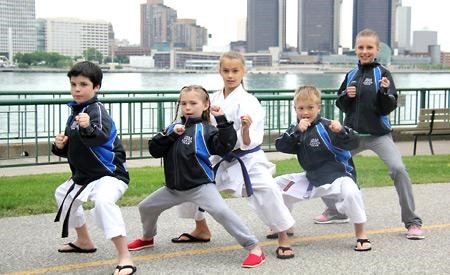There is an old Japanese flag covered in handwritten Japanese script hanging on the wall behind the desk in Sensei Frank Clayton’s office at Canadian Martial Arts Academy on Joyce Avenue.
He found the flag at a flea market in Ontario when he was a young man and has had it ever since. He carried it with him through the thick and thin of his life, a sometimes rugged journey that eventually led him here to Powell River.
“It was hanging on the wall in my dojo in New Westminster,” he said “Josh Kojima was the father of one of my students. He came in one day and offered a lot of money for it. He may have recognized a name on the flag. In any case, it meant something to him. Turns out it was signed by a platoon of WWII Japanese soldiers.” At top-centre of the flag there is a saying that, when translated, reads: “To win at all costs,” a phrase that in some ways has defined Clayton’s life.
By the time he moved here, Clayton had already amassed several life-times’ worth of experience, street smarts and knowledge, both from life itself, and from mentors and teachers he’d encountered along the way. Under the guidance of martial arts masters Sensei Richard Kim, Sensei Don Warrener, Sensei Meitoku Yagi, Sensei Pat McCarthy, Meitatsu Yagi Okinawa and Hedemi Tamayoes, to name a few, he would himself be recognized around the world as a leader in Martial arts.
Then there were the personal development gurus—the likes of Zig Ziglar, Robert Schuller, Brian Tracy and Anthony Robbins.
Through his teaching, Clayton learned the skill, discipline and perspective from which his own personal philosophy would emerge, a philosophy that is at the very heart of his teaching.
Clayton has won numerous national fighting championships and a world championship. He is a sixth dan Meibukan Goju-ryu Karate and third dan RyuKyu Kobudo as well as founder and chief instructor of Canadian Martial Arts Academy.
He arrived in Powell River looking forward to a change of pace. After establishing academies in Mission, Vernon and New Westminster, he wanted to relax a little. But relaxation would not be in the works for very long, as evidenced by the Canadian Martial Arts Academy dojo on Joyce.
Over his career he has coached hundreds if not thousands of children, instilling positive, fundamental life skills and moral fibre that his students take out the door with them.
“I believe in the law of reciprocity,” said Clayton. “You get what you give. When I teach my students, it’s not just about learning the art of karate. I teach my kids a combination of self-discipline, commitment, patience and perhaps foremost, dedication. With the actual physical discipline itself, I try to connect with my students. I try to teach them so they leave here with foundation, direction and self-assurance, that they can take out there with them,” he said, indicating to the door.
The effectiveness of Clayton’s teaching is evident in the results. Over the years, his students have fought to win nine junior world championships. On another occasion, he took 13 of his young students from Powell River to join another six from his academy in Mission, and went to Las Vegas to compete in a renowned international Martial arts tournament. When the tournament was over, his team left heavy with extra baggage, but light in spirit. Among the 19 competitors from BC, there were 41 medals.
In October 2013, Clayton, accompanied by 13 students he hand-picked himself, travelled to a tournament in Victoria, BC. The team earned seven gold, 13 silver and 12 bronze medals. “These students weren’t picked randomly from the group,” said Clayton. “The kids didn’t get to choose to come with me. They had to qualify if they wanted to compete in this tournament—in any tournament. They have to work for it. This is a big part of how I teach my students.”
Clayton’s tenacity and commitment are qualities that are passed on to his students. He demonstrates positive thinking and a proactive, directed approach to life.
He explained that often when the students come in they don’t understand what it means to work for something. “Some of our kids today suffer a sense of entitlement. They feel they are owed something without having to work [for] it. We celebrate mediocrity and our kids suffer for it later on in life when suddenly there is no one there to hand them the pleasures in life for free. Life does not treat you well when you have this kind of orientation to the big wide world.”



